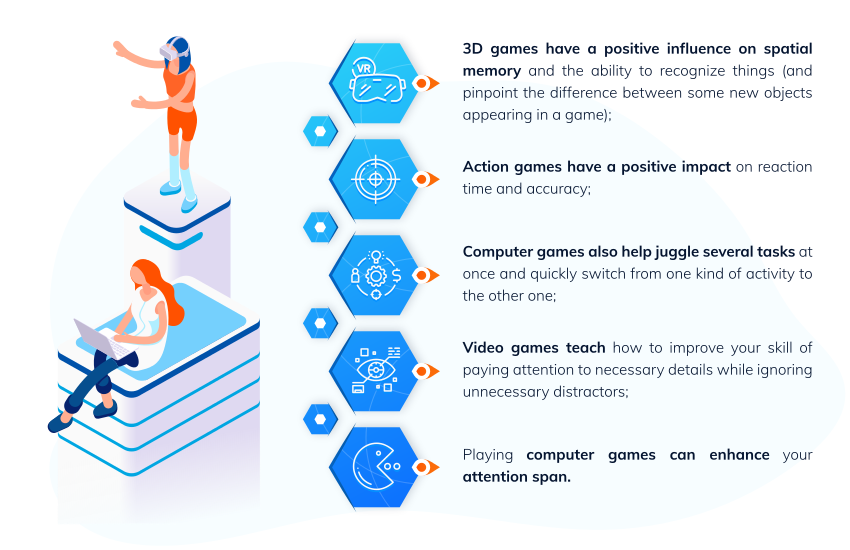The Unexpected Benefits Of Computer Games: A Deeper Look At Their Impact
The Unexpected Benefits of Computer Games: A Deeper Look at Their Impact
Related Articles: The Unexpected Benefits of Computer Games: A Deeper Look at Their Impact
Introduction
With enthusiasm, let’s navigate through the intriguing topic related to The Unexpected Benefits of Computer Games: A Deeper Look at Their Impact. Let’s weave interesting information and offer fresh perspectives to the readers.
Table of Content
The Unexpected Benefits of Computer Games: A Deeper Look at Their Impact

For decades, computer games have been a source of entertainment and fascination for millions. While often viewed as a frivolous pastime, a growing body of research reveals a surprising truth: computer games can be a potent force for good, offering a range of cognitive, social, and emotional benefits. This article delves into the multifaceted world of computer gaming, exploring how it can positively influence individuals across various aspects of their lives.
Cognitive Enhancement: Sharpening the Mind through Play
The immersive nature of computer games presents a unique opportunity for cognitive training. Games often demand quick thinking, strategic planning, and problem-solving, all of which contribute to the development of key cognitive skills.
- Spatial Reasoning and Navigation: Games like strategy titles and first-person shooters require players to mentally map and navigate complex environments, enhancing their spatial reasoning abilities. This skill is crucial for tasks like reading maps, understanding spatial relationships, and even performing surgery.
- Attention and Focus: Games often present players with a barrage of stimuli, demanding their undivided attention to succeed. This constant focus training can improve concentration and attention span, beneficial for academic studies, work, and daily life.
- Memory and Recall: Games that involve memorizing information, sequences, or patterns, like puzzle games and RPGs, strengthen memory and recall skills. This can be advantageous for learning new languages, remembering important details, and performing tasks requiring information retention.
- Decision-Making and Problem-Solving: From strategy games to puzzle titles, computer games often require players to analyze situations, weigh options, and make critical decisions. This process strengthens decision-making abilities and problem-solving skills, valuable assets in both professional and personal contexts.
- Critical Thinking and Creativity: Games that involve creative expression, like sandbox games and open-world titles, encourage players to think outside the box and find innovative solutions. This fosters critical thinking and creativity, essential for innovation and problem-solving in all areas of life.
Social Interaction and Collaboration: Building Connections through Shared Experiences
Contrary to the stereotype of solitary gamers, many computer games foster social interaction and collaboration, promoting teamwork and communication skills.
- Multiplayer Games: Online multiplayer games allow players to connect with others from around the world, engaging in cooperative gameplay, competing against each other, or simply socializing in virtual spaces. This fosters communication, teamwork, and social interaction skills.
- Esports and Competitive Gaming: The rise of esports has created a thriving competitive scene, where players hone their skills and compete against others in organized tournaments. This fosters teamwork, strategic thinking, and communication skills, often requiring players to work together to achieve a common goal.
- Shared Experiences and Communities: Gaming communities provide a space for players to connect with others who share their interests, discuss strategies, and build friendships. This fosters a sense of belonging and social support, promoting well-being and reducing feelings of isolation.
Emotional Regulation and Resilience: Overcoming Challenges and Embracing Failure
Games can offer a safe and controlled environment to practice emotional regulation and resilience, skills crucial for navigating the complexities of real life.
- Managing Frustration and Failure: Games often present players with challenges that require persistence and resilience. Learning to overcome setbacks and frustration within the game can translate to improved emotional regulation and coping mechanisms in real-life situations.
- Building Confidence and Self-Esteem: Successfully navigating challenging games can boost confidence and self-esteem, as players experience a sense of accomplishment and mastery. This can translate to greater confidence in tackling challenges and pursuing goals outside the game.
- Empathy and Perspective-Taking: Games that involve role-playing and character development can encourage players to step into the shoes of others, fostering empathy and understanding of different perspectives. This can enhance interpersonal relationships and social interactions.
Beyond Entertainment: Exploring the Educational Potential of Games
The benefits of computer games extend beyond entertainment, offering a valuable educational tool for learning and skill development.
- Engaging Learning Environments: Games can create immersive and engaging learning environments that captivate students and make learning more enjoyable. This can improve motivation, engagement, and retention of information.
- Skill-Based Learning: Games can be designed to teach specific skills, such as problem-solving, critical thinking, or language proficiency. This offers a practical and interactive approach to learning, making it more effective and engaging.
- Accessible and Inclusive Learning: Games can be used to create accessible and inclusive learning experiences for students with diverse needs. This can help overcome learning barriers and provide equal opportunities for all.
FAQs: Addressing Common Concerns and Misconceptions
Q: Are computer games addictive?
A: While some individuals may experience problematic gaming patterns, the vast majority of players enjoy games in moderation without experiencing negative consequences. It’s crucial to promote healthy gaming habits, such as setting time limits and prioritizing other activities.
Q: Do computer games promote violence?
A: The link between violent video games and real-world aggression is complex and inconclusive. While some studies suggest a correlation, others have found no significant link. It’s important to note that games are a form of entertainment, and players should be encouraged to distinguish between fantasy and reality.
Q: Are computer games a waste of time?
A: Computer games, like any form of entertainment, can be a valuable use of time if enjoyed in moderation. They offer cognitive benefits, social interaction, and emotional regulation opportunities, making them a worthwhile activity for individuals of all ages.
Tips for Healthy Gaming Habits
- Set Time Limits: Establish clear time limits for gaming to ensure balance with other activities.
- Take Breaks: Regular breaks are essential to prevent eye strain, fatigue, and overuse.
- Choose Games Wisely: Opt for games that promote cognitive development, social interaction, and positive emotional experiences.
- Engage in Other Activities: Balance gaming with other hobbies, interests, and social interactions.
- Monitor Your Well-being: Pay attention to your mood, sleep patterns, and physical health to ensure gaming is not negatively impacting your overall well-being.
Conclusion: Embracing the Benefits of Computer Games
Computer games are no longer a niche hobby but a multifaceted medium with significant potential for positive impact. From cognitive enhancement to social interaction and emotional regulation, games offer a range of benefits that can enrich individuals’ lives. By understanding the potential of computer games and promoting healthy gaming habits, we can unlock their full potential for learning, growth, and well-being.






![Why Gaming Is A Positive Element In Life [Infographic] Bit Rebels](http://www.bitrebels.com/wp-content/uploads/2017/02/gaming-statistics-and-benefits-infographic.jpg)

Closure
Thus, we hope this article has provided valuable insights into The Unexpected Benefits of Computer Games: A Deeper Look at Their Impact. We thank you for taking the time to read this article. See you in our next article!